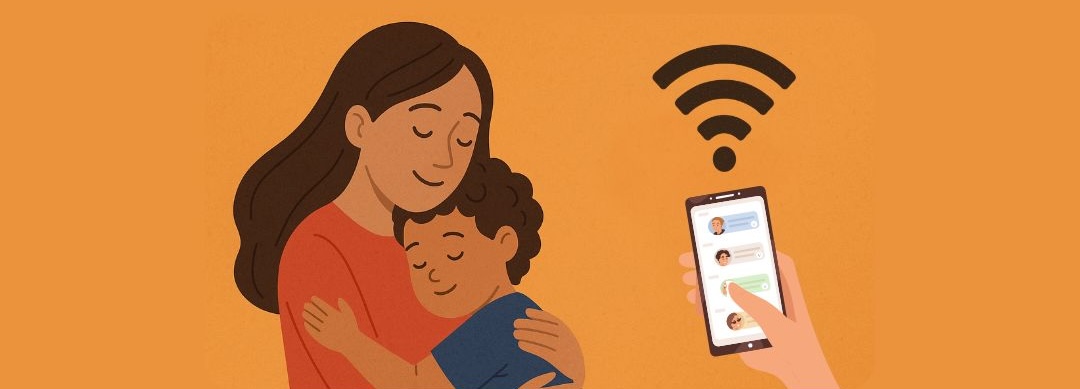

Why Hugs Matter More Than Wifi?
Why Hugs Matter More Than Wifi?
by Bhavya Paruthi

In our recent Reading Club session, we explored the theme: “The comfort connection: why hugs matter more than WiFi.”
This session was incredibly close to my heart, not just because of the theme, but because it marked two firsts: our very first time using storytelling powered by the science of human behaviour, and the first time I had the opportunity to lead a session myself.
Our plan was simple, let’s highlight the importance of human connection. “Why?” you ask. Because in a world racing ahead with screens, pings, and endless scrolls, it’s the quiet comfort of human touch and presence that many of us are longing for.
This realisation became clearer to me when I worked with RIEDU on previous Book Club sessions and Young Editors Program, only to notice a pattern: many children felt unanchored. In the rush of daily life, they’re often left feeling lost, disconnected, and alone. Despite being surrounded by people and devices, they’re missing something deeper in the form of meaningful connection, both from friends and family.
And let’s face it, in today’s time, most of us may survive without a sense of belongingness, but my god if my Netflix is buffering for 30 seconds, I may start losing my mind.
That’s what we’re trying to change. This session was designed for an audience of 10-17 year olds, though any age group was welcome. At RIEDU, we’ve always had an audience of brilliant young minds and this session was no different.
We began the session with reading a simple story about a teenager, who was eager to “grow up” and leave behind his childhood favourites including cartoons, hand holding of his parents, and an oddly comforting blue hoodie with bunny ears. All in an effort to claim his new found independence.
With the story, we explored Harry Harlow’s renowned Monkey Experiment which showed us something beautifully human: we all need more than just food to thrive. The baby monkeys clung to a soft, cloth mother, not because she fed them, but because she felt safe. It reminds us that love, comfort, and simply being held are what truly help us grow and feel secure in the world.
The energy in the room (and on the screen) was absolutely palpable. We weren’t just reading together, we were collectively feeling, questioning, and understanding what it really means to feel safe, seen, and soothed in a world that often values speed over softness.
I was especially moved during our discussion on the question, “Why do people sometimes feel lonely even when life seems ‘perfect’ on the outside?”. When a 9-year-old bravely shared her personal experience with loneliness, it took me by surprise. It was a powerful reminder of just how deeply mental health challenges are affecting even the youngest among us today.
To parents reading this: your teenager may ask for space, roll their eyes at affection, or push back when you offer help, but that doesn’t mean their need for connection has vanished. In fact, during adolescence, they’re actively shaping their sense of identity, figuring out what sets them apart and where they belong. And in doing so, they might distance themselves from childhood comforts or people who once anchored them.
It’s important that parents find a balance between providing them the independence they need while also letting them know that they will always be there for them. That’s when emotional hugs matter most: listening without rushing to fix, remembering small things they love, showing up when they least expect it. A quiet “I’m here,” a shared memory, or just being present, these are ways of hugging without touch, of reminding them they’re never alone.
And sometimes, connection goes beyond people. It could be instilled in things that hold some of their dearest memories. A hoodie, pillow, soft toy, a blanket, or even a song. These can make them feel safe, seen and connected in times when they feel like they can’t express themselves to a person. The point here being, it’s perfectly normal to have a sense of attachment with objects, just as long as they bring you comfort and a piece of love.
We ended the session on a note of sharing our comfort song with the rest of the participants (link), feel free to add yours too! We also encouraged the participants to send a thank you note to someone important in their lives and to let them know how much they are valued.
With this successful reading club session, we plan to bring RIEDU’s Reading Club offline in Delhi NCR for the 10-17 year age group. The idea, again, is simple, let’s inculcate a reading habit in kids while having the theme be of meaning and value.
For our audience of parents online, here are a few thoughtful ways you can build connection with your children:
- Ask Reflective Questions
“What still brings you comfort?” or “What does love feel like to you?” - Comfort Object Sharing
Talk about an object (like a hoodie or toy) that brings comfort, yours and theirs. - Empathy Role Play
Discuss how the monkey in Harlow’s experiment might have felt. Build empathy together. - Belonging Scale
Ask, “How much do you feel like you belong today?” (Rate 1- 5) and “Who makes you feel safe?” - Mini-Story Prompt
“What’s your version of Kabir’s blue hoodie?” Let them write or draw it. - Create a Comfort Playlist
Share songs that feel safe or soothing, and talk about why. - Text Someone Who Holds You
Encourage them to thank someone who makes them feel loved. It’s simple but powerful.
Are you a parent interested in enrolling your child in the RIEDU Reading Club? Reach out to us at info@riedu-sdg.com. Let’s build a community of thoughtful, expressive, and emotionally intelligent young readers, one story at a time.



